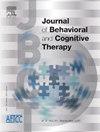法国人对积极情绪量表反应的验证
IF 1.6
Q3 PSYCHIATRY
引用次数: 0
摘要
人们如何调节自己的积极情绪已被发现是心理健康的关键,同时与双相情感障碍和抑郁症等心理健康障碍有关。本研究的目的是验证法国版的积极情绪反应量表(RPA, Feldman et al., 2008),该量表提供了两种情绪调节策略的测量,以上调积极情绪(反刍)和下调积极情绪(抑制)。这项在线研究由不同的问卷组成,旨在分析法国非临床人群RPA的心理测量特性。所提出的三因素模型显示出对数据的充分拟合,所有近似拟合指标显示出可接受的模型拟合。其中一项对阻尼因子的负荷较低,因此被排除在分析之外。RPA的三个分量表具有良好的内部一致性。量表具有良好的收敛效度和可接受的重测效度。这项在线研究可以与自我报告措施的共同限制相关联。此外,我们的研究结果需要在未来的研究中得到验证,以验证其判别能力和测量不变性。总之,法语版的RPA可以被认为是可靠的,用于评估人们如何上调和下调积极情绪。与其他情绪调节措施相反,RPA特别关注积极情绪,可能在双相情感障碍、抑郁症和其他以积极情绪调节不良为特征的精神健康障碍的背景下特别相关。本文章由计算机程序翻译,如有差异,请以英文原文为准。
French validation of the responses to positive affect scale
How people regulate their positive affect has been found to be key for mental health, while being implicated in mental health disorders such as bipolar disorder and depression. The goal of this study was to validate a French version of the Responses to Positive Affect Scale (RPA, Feldman et al., 2008), which provides a measure of two emotion regulation strategies to up-regulate positive affect (rumination) and down-regulate it (dampening). This online study was comprised of different questionnaires designed to analyse the psychometric properties of the RPA in French non-clinical populations. The proposed three-factor model shows an adequate fit to the data, with all approximate fit indices showing acceptable model fit. One item had a lower loading on the dampening factor and was excluded from the analyses. The three subscales of the RPA showed satisfactory internal consistency. The scale also demonstrates good convergent validity and acceptable test–retest validity. This online study can be associated with common limits of self-reported measures. Moreover, our results should be replicated in future studies to validate its discriminant capacity and measurement invariance. In conclusion, the French version of the RPA can be considered reliable for assessing how people upregulate and downregulate positive emotions. Contrary to other measures of emotion regulation, the RPA focus specifically on positive affect and might be particularly relevant in the context of bipolar disorder, depression and other mental health disorders characterised by maladaptive regulation of positive emotions.
求助全文
通过发布文献求助,成功后即可免费获取论文全文。
去求助
来源期刊

Journal of Behavioral and Cognitive Therapy
Psychology-Clinical Psychology
CiteScore
3.30
自引率
0.00%
发文量
38
审稿时长
60 days
 求助内容:
求助内容: 应助结果提醒方式:
应助结果提醒方式:


